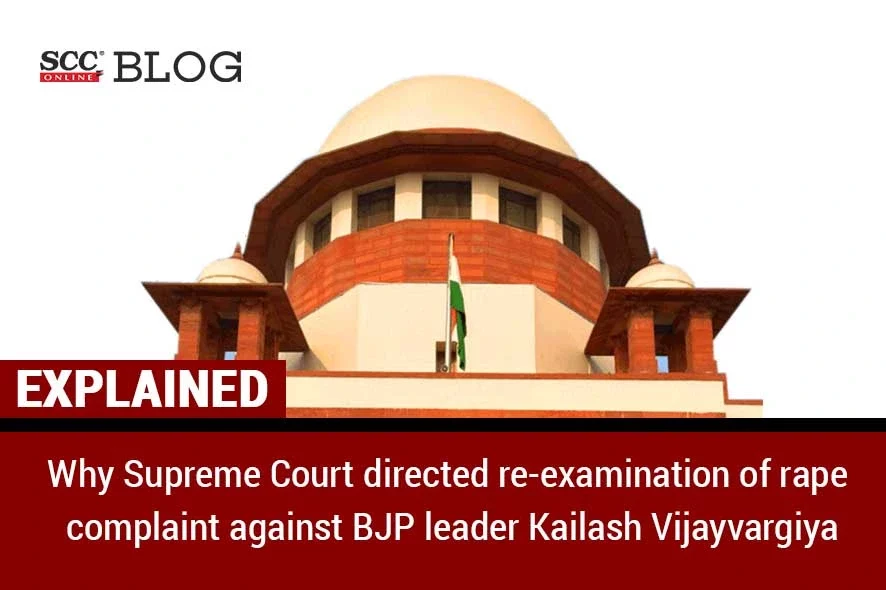Supreme Court: In a Criminal Appeal challenging the judgment and order passed by Calcutta High Court on 1-10-2021 setting aside order of Magistrate and remitting the matter back, which was followed by Magistrate’s directions to register FIR against BJP leader Kailash Vijayvargiya, the Division Bench of M.R. Shah* and Sanjiv Khanna, JJ. set aside the recent order passed by Magistrate on registration of FIR and remitted the matter back to the Magistrate to apply judicial mind and exercise discretion in the matter of rape complaint with a delay of 2 years.
Present appeal arose out of a complaint under Section 156(3) of CrPC alleging rape against the original complainant by all three appellants wherein, the CJM dismissed the said complaint in a well-reasoned and detailed order while refusing to direct the Police to register an FIR.
The Court observed that the SHO did conduct a preliminary enquiry following the rule in Lalita Kumari v. Govt. of U.P., (2014) 2 SCC 1 and refused to register the FIR on finding a delay of 2 years in filing the complaint. It further pointed towards the detailed order of dismissal passed by the CJM on complaint u/s 156(3) of CrPC, verifying the truth and veracity of the allegations and quashing of the said order by High Court while not following the decisions of Mukul Roy v. State of W.B., 2018 SCC OnLine Cal 4861 and Priyanka Srivastava v. State of U.P., (2015) 6 SCC 287 and directing reconsideration of the said complaint.
The Court in the instant matter considered
-
Whether the CJM was justified in verifying the truth and veracity of allegations at the stage of deciding the application under Section 156(3) of CrPC?
-
Whether Magistrate was required to apply judicial mind at that stage?
The Court said that “the law in application should protect blameless against those informants who level false allegations and abuse the law causing distress, humiliation and damage to reputation.” The Court examined Chapter 12 of CrPC dealing with information to Police and their power to investigate. The Court explained that “to strike a balance, distinction is drawn between power of arrest of an accused person under Section 41 and registration of an FIR under Section 154 of the Code. While registration of an FIR is mandatory, the arrest of the accused on registration of the FIR is not.” It further added that Reasonableness or credibility of information is not a condition precedent for registration of the FIR.
The Court relied on Abhinandan Jha v. Dinesh Mishra, (1967) 3 SCR 668 wherein, it was observed that “The power of the Magistrate is conferred once a report in terms of Section 157 or a report under Section 173(3) is submitted by the Police, is not absolutely powerless in view of the powers conferred in terms of Sections 159 and 173, and infra, Section 202 of CrPC.”
The Court relied on Priyanka Srivastava (supra) that “When the Magistrate is satisfied that the allegations made disclose commission of a cognizable offence, he must stay his hands, direct registration of an FIR and leave it to the investigative agency to unearth the facts and ascertain the truth of the allegations.” The Court relied on Mohd. Yousuf v. Afaq Jahan, (2006) 1 SCC 627 and Anju Chaudhary v. State of U.P., (2013) 6 SCC 384 regarding the scope of Magistrate’s power to direct an FIR u/s 156(3) CrPC.
The Court observed that the High Court was correct in remitting the matter to the CJM for further examination and set aside the order passed by Magistrate on remand after High Court’s remission of the matter back to the CJM directing registration of FIR. The Court further remitted the matter back to the Magistrate to apply his judicial mind and exercise discretion on whether or not to issue directions under section 156(3) or whether he can take cognizance and follow the procedure under section 202.
[Kailash Vijayvargiya v. Rajlakshmi Chaudhuri, 2023 SCC OnLine SC 569, Judgment dated 4-5-2023]
*Judgment authored by: Justice M.R. Shah
Advocates who appeared in this case :
For Appellant: Advocate on Record Nachiketa Joshi, Advocate on Record Arvind Gupta, Advocate Anil Kumar Sahu, Advocate Mohit Bidhuri, Senior Advocate Mahesh Jethmalani, Advocate Kabir Shankar Bose, Advocate Amit Mishra, Advocate on Record Surjendu Sankar Das, Advocate Annie Mittal;
For Respondents: Advocate on Record Rauf Rahim, Senior Advocate R. Basant, Advocate on Record Astha Sharma, Advocate Srisatya Mohanty, Advocate Anju Thomas, Advocate Sanjeev Kaushik, Advocate Mantika Haryani, Advocate Shreyas Awasthi, Advocate Himanshu Chakravarty, Advocate Ripul Swati Kumari, Advocate Bhanu Mishra, Advocate Devvrat Singh, Advocate Muskan Surana.






